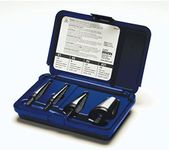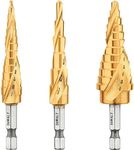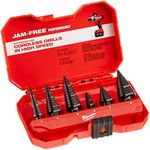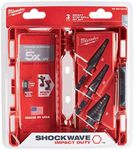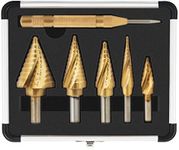Buying Guide for the Best Step Drill Bits
Choosing the right step drill bit can make your drilling tasks much easier and more precise, especially when working with sheet metal, plastics, or thin materials. Step drill bits are designed to drill holes of various diameters with a single bit, thanks to their stepped design. To find the best fit for your needs, it's important to understand the key specifications and how they relate to the type of work you plan to do.MaterialThe material of a step drill bit determines its durability and suitability for different tasks. Common materials include high-speed steel (HSS), cobalt, and titanium-coated bits. HSS is good for general use on softer materials like plastic and thin metal. Cobalt bits are tougher and handle harder metals, while titanium coatings add extra wear resistance. If you mostly work with softer materials, HSS is usually enough. For frequent or heavy-duty use, especially on tougher metals, consider cobalt or titanium-coated bits.
Step Sizes and RangeStep sizes refer to the range of hole diameters the bit can create, and how many different sizes are available on a single bit. Some bits have small increments between steps, while others have larger jumps. If you need precise control over hole size, look for bits with smaller step increments. If you only need a few common sizes, a bit with larger steps may be sufficient. Think about the typical hole sizes you need for your projects and choose a bit that covers those sizes.
Shank Type and SizeThe shank is the part of the bit that fits into your drill. Common shank types include round, hex, and tri-flat. Hex and tri-flat shanks provide better grip and reduce slipping in the drill chuck, which is helpful for more powerful drills or tougher materials. Make sure the shank size matches your drill's chuck size—most household drills accept 1/4-inch or 3/8-inch shanks. Check your drill before buying to ensure compatibility.
CoatingCoatings like titanium nitride or black oxide can improve a bit's performance by reducing friction and increasing resistance to heat and wear. This means the bit will last longer and cut more smoothly. If you plan to use the bit frequently or on tougher materials, a coated bit is a good investment. For occasional or light use, an uncoated bit may be sufficient.
Number of StepsThe number of steps on a bit determines how many different hole sizes you can make with it. More steps mean more size options, but the bit may be longer and harder to control in tight spaces. If you need versatility and work with a variety of hole sizes, choose a bit with more steps. If you only need a few sizes, a bit with fewer steps may be easier to handle.
Point AngleThe point angle is the angle at the tip of the bit, which affects how easily it starts drilling and how cleanly it cuts. Common angles are 118° and 135°. A sharper angle (like 118°) is good for softer materials, while a flatter angle (like 135°) is better for harder materials and reduces walking (slipping) at the start. Consider the materials you’ll be drilling most often when choosing the point angle.
